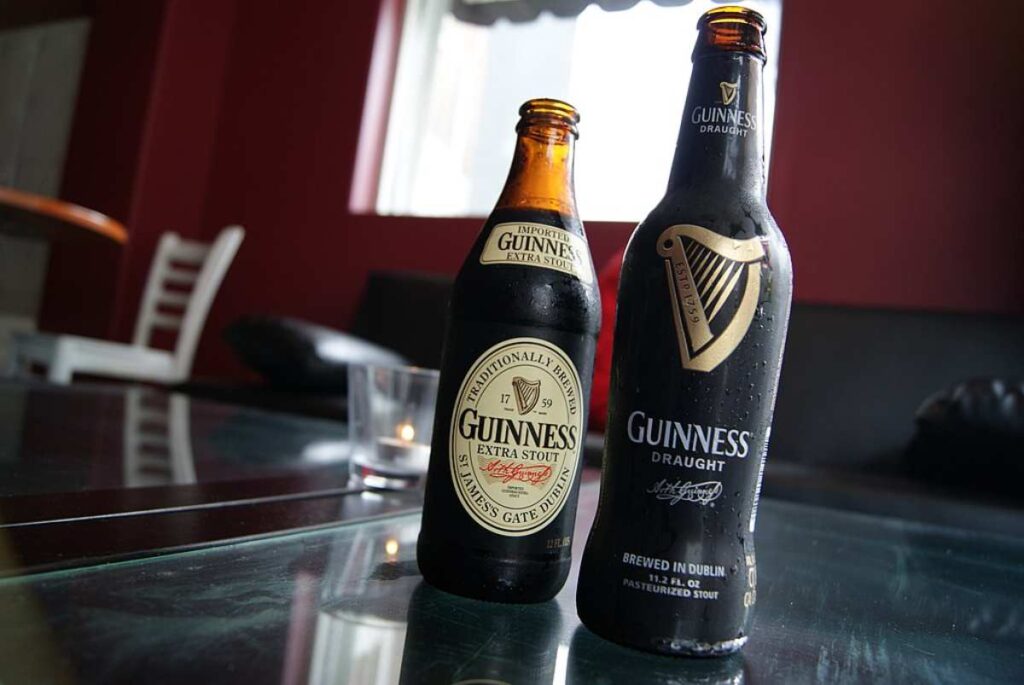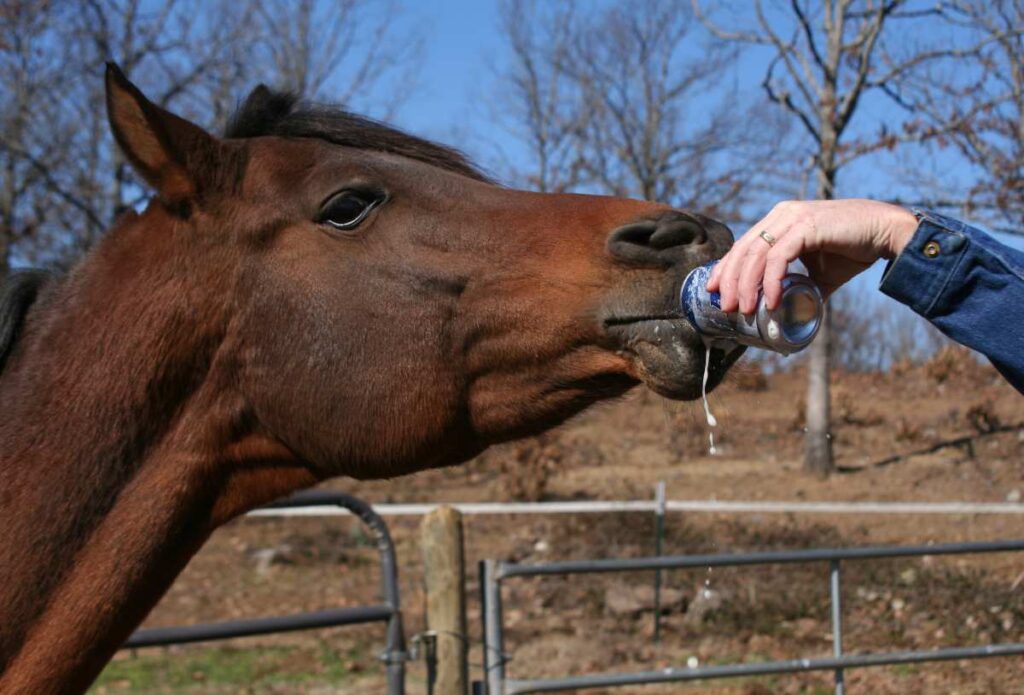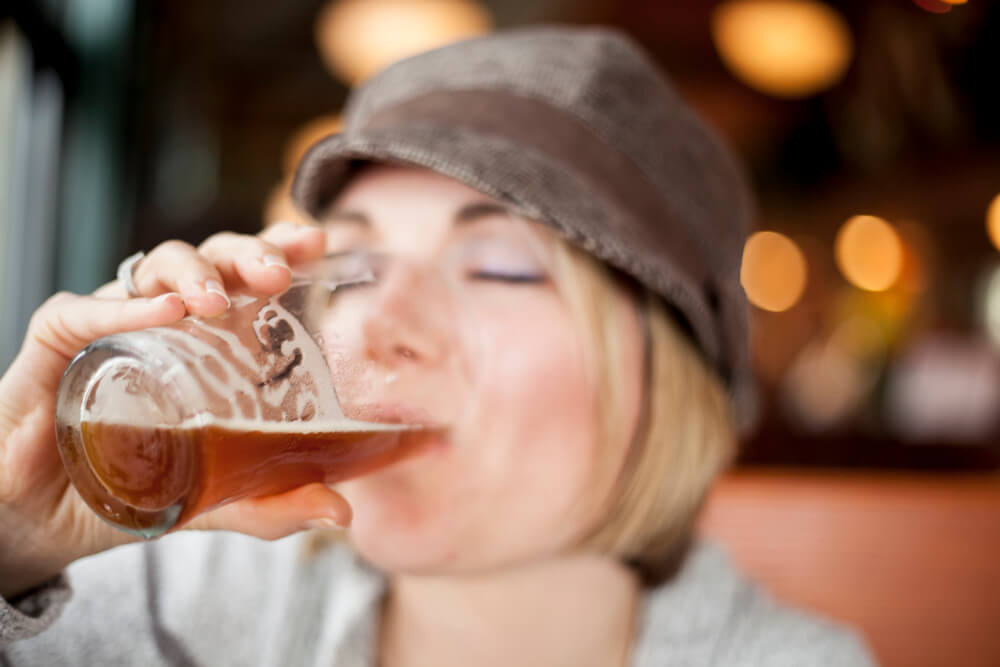Are you looking for a guide to the best beer for horses? Learn more in this article.
The idea of giving beer to horses might strike you as unusual at first, but this age-old tradition has been a popular practice among horse owners for some time. The question that arises, however, is which beer might be the best for your equine friend? This article will explore the benefits of various beer types for horses, helping you decide which one is perfect for your beloved steed.
Beer’s benefits for horses reach beyond its proposed aid for anhidrosis, a condition in which a horse loses the ability to sweat properly, negatively affecting its performance and well-being. In fact, many race tracks and showjumpers include Guinness stout beer as a part of their horse’s diet, aiming to promote overall health. This article will dive into the various advantages of incorporating beer into your horse’s diet and help you make an informed decision on which type of beer would be the most beneficial.
The brewing world offers countless types of beers with diverse flavors and ingredients, but not all of them may be suitable for your horse. As you navigate through this article, you’ll discover expert insights on which beer types are best for horses and understand the specific benefits your equine companion may experience when they enjoy a refreshing drink alongside you. So, saddle up and let’s explore the wonders of beer for horses together!
Table of Contents
Horses and Beer: A Brief Overview

Beer for horses may sound unusual, but it’s actually a practice that has been around for quite some time. In certain cases, veterinarians even recommend it as a part of a horse’s regular diet1. So, let’s have a friendly chat about beer and its potential benefits for horses.
First, let’s discuss why beer might be beneficial for our equine friends. One of the key reasons is the presence of yeast in beer, which can be useful for a horse’s digestion2. Yeast aids in breaking down carbohydrates and proteins, supporting gastrointestinal health and overall wellbeing.
Guinness Stout beer, in particular, is often recommended for horses with anhidrosis, a condition that affects the horse’s ability to sweat3. Anhidrosis can be harmful to the horse’s health, so incorporating beer in their diet may potentially help alleviate this problem.
It’s important to note that horses aren’t going to get drunk from consuming beer. Horses have a significantly higher body weight compared to humans, so it would take an enormous amount of beer to have an intoxicating effect4. In moderation, beer could be a safe, even beneficial, addition to a horse’s diet.
In summary, the idea of horses and beer might initially seem odd, but it actually has a history of being incorporated into a horse’s diet for some potential benefits. From yeast aiding digestion to helping with anhidrosis, beer could play a useful part in supporting a horse’s wellbeing. As long as the consumption is in moderation, there isn’t much concern about horses getting intoxicated. Remember, always consult with a veterinarian before introducing any new supplement or dietary change to your horse’s diet.
Nutritional Benefits of Beer for Horses
Horses can enjoy some nutritional benefits from consuming beer as part of their diet. This section will discuss key nutrients found in beer that can be beneficial for horses.
Vitamins and Minerals
Beer contains essential vitamins and minerals that can contribute to a horse’s health. For example, it provides niacin, B vitamins (B1, B3, and B6), folate, and flavonoids, which are important for overall well-being. While the amounts of these nutrients in beer might not be sufficient to meet a horse’s total dietary requirements, they can still offer supplemental value.
B Vitamins and Iron
The presence of B vitamins in beer can contribute to various aspects of a horse’s health. B vitamins are involved in building blood cells, maintaining nerve cells, and metabolism. Iron, another essential mineral, can also be found in beer, although it is not mentioned as often as the B vitamins. Together, these nutrients help ensure that horses maintain proper energy levels, strong immune systems, and overall good health.
Antioxidants and Probiotic Support
Beer is also known for its antioxidant content, particularly from the phytochemicals in hops. Quercetin, an anti-inflammatory antioxidant, and RIAA (rho-iso-alpha acid) are two notable phytochemicals that can help regulate insulin and decrease negative effects from lipotoxicity. These antioxidants can contribute to a horse’s overall health and help fight against oxidative stress.
In addition to its antioxidant properties, beer has probiotic components that aid in maintaining a healthy gut. Yeast, an essential ingredient in beer, can provide horses with probiotics that support their digestive systems and keep the gut microbiota in balance.
Overall, consuming beer in moderation can indeed provide some nutritional benefits to horses, such as vitamins, minerals, antioxidants, and probiotic support. However, it is essential to offer beer to horses in a controlled and responsible manner to avoid any potential negative effects.
Feeding Beer to Horses
Feeding beer to horses has become a popular concept in horse care. There are some potential benefits associated with adding beer to a horse’s diet, including digestive health and help for horses with anhidrosishorses with anhidrosis. Let’s dive into the logistics of feeding beer to horses, including frequency and amount, water and electrolytes, and considerations for picky eaters.
Frequency and Amount
Feeding beer to horses should be done in moderation. It is important not to replace essential nutrients and water with beer. Generally, it is suggested to offer a small amount of beer, such as a can of Guinness Stout, as a supplemental treat once a day or a few times a week. It is not advisable to give large quantities or allow your horse to consume beer throughout the day.
Water and Electrolytes
While beer can offer some benefits to horses, it is essential to ensure they are still receiving adequate water and electrolytes in their diet. A horse’s primary source of hydration should continue to be fresh water, and beer should never serve as a substitute. Providing a balanced diet with key electrolytes, such as sodium, potassium, and magnesium, is crucial for horses’ overall health and well-being.
Flavor and Picky Eaters
Some horses may be more receptive to the taste of beer than others. If you are considering adding beer to your horse’s diet, it’s essential to monitor their reaction to the flavor. For picky eaters, introducing a small amount of beer and gradually increasing the quantity over time may help them acclimate to the taste. Alternatively, you could try different types of beer to find one that your horse enjoys most. Remember to always prioritize your horse’s diet and overall health, and not force them to consume beer if they don’t seem to enjoy it.
Popular Beers for Horses
In this section, we will explore some popular beers that are commonly given to horses. These beers are believed to provide certain health benefits when consumed in moderation.
Guinness and Guinness Stout Beer
Guinness is a well-known stout beer that has been recommended by horse owners and veterinarians for various reasons. It is known to be a regular part of supplementing a horse’s diet on many race tracks and in the barns of well-known show jumpers. The dark, rich flavor of Guinness Stout Beer is not only enjoyed by humans but also by our equine friends.
Some of the potential benefits of Guinness for horses include:
- Improving digestive health
- Aiding in the recovery of anhidrosis (the inability to sweat)
- Providing additional nutrients and calories
Dark Beer and Lagers
Dark beers and lagers are also popular choices for horses due to their higher calorie content and potential health benefits. These beers typically contain more nutrients than lighter options, which may contribute to supporting a horse’s overall well-being. However, it is important to remember that moderation is key, and excessive beer consumption should be avoided for both humans and horses.
Unfiltered Beers
Unfiltered beers are another option to consider when looking for beer options for horses. These brews have not undergone the filtration process, allowing the yeast and other nutrients to remain in the beverage. This may provide additional health benefits such as improved digestion and increased nutrient content. As with any beer, remember to practice moderation and consult with a professional before introducing any new beverage into your horse’s diet.
In conclusion, while there may be potential benefits to offering your horse beer, it is important to remember that moderation is key. Always consult with a veterinarian or equine nutritionist before introducing any new beverage into your horse’s diet.
Potential Health Concerns
When considering beer for horses, it’s important to understand the potential health concerns. In this section, we’ll cover Anhidrosis and Sweating, Liver and Metabolism Issues, and Veterinarian Guidance.
Anhidrosis and Sweating
Anhidrosis is a condition where a horse is unable to sweat properly, leading to overheating and dangerous consequences. While beer for horses can have some benefits to their digestive health, it is important to monitor their sweating and ensure they are not at risk for anhidrosis. This is especially critical in hot climates where humidity is high.
Liver and Metabolism Issues
Beers contain yeast, barley, and hops, which have varying effects on a horse’s metabolism. For example, the phytochemicals in hops, like Quercitin, can be a powerful anti-inflammatory antioxidant. However, excessive intake of beer can lead to potential liver and metabolism issues. Horses that already have complications in these areas should be monitored closely if they consume beer.
Veterinarian Guidance
When including beer in your horse’s diet, it’s essential to consult your veterinarian first. They can recommend the appropriate amount of beer, considering your horse’s unique health conditions and needs. Beer can provide benefits like improved appetite, energy, and b-vitamins, but your vet will help ensure that it is suitable for your horse.
Always keep a friendly approach, and remember that moderation and proper guidance are key when exploring alternative options like beer for horses. Make sure to monitor your horse’s health closely, stay attentive to any potential issues, and keep in touch with a veterinarian for guidance and support.
Notable Horses and Beer

Did you know that many famous horses have enjoyed beer in their diet? One of the most renowned equine beer drinkers is Zenyatta. According to her trainer, Joe Shirreffs, she gets regular treats like oats, aloe vera juice, and a Guinness when she’s been really good. It’s not just Zenyatta who’s a fan, though.
Let’s look at some other famous horses and their relationships with beer:
- Tapit: This renowned racehorse is also known for enjoying a Guinness on occasion. It just goes to show that not only do these incredible athletes excel on the track, but they also have great taste in beer!
- Racehorses and Show Jumpers: Across the country, famous racehorses and show jumpers are known to have Guinness as part of their diet. It has been recommended as an aid in anhidrosis (the inability to sweat), helping with their overall performance and well-being.
It’s important to note that while veterinarians do recommend beer for horses, it should never be given in excessive amounts or replace vital nutrients in their diet. When enjoyed in moderation, beer can be a delicious, healthy, and fun treat for our equine friends. Cheers!
Alternatives to Beer
While some horse owners may provide their equine friends with beer due to its potential digestive health benefits, there are alternative options available that can boost nutrition and provide additional benefits. For high-performance horses, it’s essential to focus on maintaining optimal health without introducing alcohol into their system.
Probiotic Supplements: These can be a great alternative to beer, providing similar benefits by promoting a healthy gut environment. Probiotics offer essential nutrients and enhance the digestive process, making them ideal for horses sensitive to alcohol or on a strict diet.
Nutritional Value: When considering options other than beer, it’s essential to pay attention to the nutritional composition of the product. Alternatives should supply key nutrients such as vitamins, minerals, and antioxidants to support horse health. Some options include soaked beet pulp and flaxseeds.
Benefits of Beer for Horses: While this article focuses on alternatives, it is worth mentioning that beer does carry some potential benefits for horses, such as improved digestion and relief from certain health conditions. However, moderation is crucial, and consulting with a vet beforehand is highly recommended.
Incorporating these alternatives into your horse’s regimen could prove beneficial while avoiding the risks associated with beer consumption. There’s no one-size-fits-all solution, so it’s essential to consult your veterinarian and tailor your approach to your horse’s specific needs.


